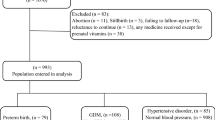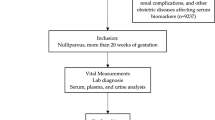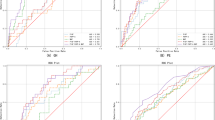Abstract
Objective
The aim of this study was to investigate the relationship between some components of metabolic syndrome (MS) and pregnancy induced hypertension (PIH).
Study design
Forty-one patients with PIH (gestational hypertension or preeclampsia) after 32 weeks of gestation were compared with 97 normotensive pregnant women. Metabolic scores (0–4) were created using standard deviations in normotensive cases: mean level + 1SD for BMI (>31 kg/m2), mean level + 1SD for triglyceride (>287 mg/dl), mean level + 1SD for fasting serum glucose (>90 mg/dl)) and mean level − 1SD for HDL (<48 mg/dl).
Results
The mean values for BMI (31.6 ± 5.7 vs. 27.7 ± 3.6; P < 0.0001), fasting triglyceride (341 ± 129 vs. 220.7 ± 67; P < 0.0001) and glucose (87.5 ± 17.1 vs. 79.6 ± 10.4; P = 0.0009) were higher in hypertensive group. The proportions of the women with a positive result for each of the components were significantly higher in the group of PIH. The percentage of the cases having 2 (35.2 vs. 8.2%; P = 0.0002) and 3 or more (27 vs. 4.1%; P = 0.0003) components of MS was higher in the hypertensive group and the percentage of the cases with none of these factors was high in the normotensive group (10.8 vs. 56.7%; P < 0.0001).
Conclusion
The presence of multiple components of MS may be a risk factor in the development of PIH. New scoring systems according to the gestational age might be useful in analyzing the risk of PIH.
Similar content being viewed by others
References
Lakka HM, Laaksonen DE, Lakka TA, Niskanen LK, Kumpusalo E, Tuomilehto J et al (2002) The metabolic syndrome and total and cardiovascular disease mortality in middle-aged men. JAMA 288:2709–2716. doi:10.1001/jama.288.21.2709
Lorenzo C, Okoloise M, Williams K, Stern MP, Haffner SM, San Antonio Heart Study (2003) The metabolic syndrome as predictor of type 2 diabetes. The San Antonio Heart Study. Diabetes Care 26:3153–3159. doi:10.2337/diacare.26.11.3153
Sattar N, Greer IA (2002) Pregnancy complications and maternal cardiovascular risk: opportunities for intervention and screening? BMJ 325:157–160. doi:10.1136/bmj.325.7356.157
Rodie VA, Freeman DJ, Sattar N, Greer IA (2004) Preeclampsia and cardiovascular risk: metabolic syndrome of pregnancy? Atherosclerosis 175:189–202. doi:10.1016/j.atherosclerosis.2004.01.038
Isezuo SA, Ekele BA (2008) Comparison of metabolic syndrome variables among pregnant women with and without eclampsia. J Natl Med Assoc 100:1059–1062
Expert Panel on Detection, Evaluation, Treatment of High Blood Cholesterol in Adults (2001) Executive summary of the third report of the National Cholesterol Education Panel (NCEP) expert panel on detection, evaluation, and treatment of high blood cholesterol in adults (adult treatment panel III). JAMA 285:2486–2497. doi:10.1001/jama.285.19.2486
Greco P, Loverro G, Selvaggi L (1994) Does gestational diabetes represent an obstetrical risk factor? Gynecol Obstet Investig 37:242–245
Kabiru W, Raynor BD (2004) Obstetric outcomes associated with increase in BMI category during pregnancy. Am J Obstet Gynecol 191:928–932. doi:10.1016/j.ajog.2004.06.051
O’Brien TE, Ray JG, Chan WS (2003) Maternal body mass index and the risk of preeclampsia: a systematic overview. Epidemiology 14:368–374. doi:10.1097/00001648-200305000-00020
Ray JG, Diamond P, Singh G, Bell CM (2006) Brief overview of maternal triglycerides as a risk factor for pre-eclampsia. BJOG 113:379–386. doi:10.1111/j.1471-0528.2006.00889.x
Mazar RM, Srinivas SK, Sammel MD, Andrela CM, Elovitz MA (2007) Metabolic score as a novel approach to assessing preeclampsia risk. Am J Obstet Gynecol 197:411.e1–411.e5
Solomon CG, Seely EW (2006) Hypertension in pregnancy. Endocrinol Metab Clin N Am 35:157–171. doi:10.1016/j.ecl.2005.09.003
Buchbinder A, Sibai BM, Caritis S, Macpherson C, Hauth J, Lindheimer MD et al (2002) National Institute of Child Health and Human Development Network of Maternal–Fetal Medicine Units. Adverse perinatal outcomes are significantly higher in severe gestational hypertension than in mild preeclampsia. Am J Obstet Gynecol 186:66–71. doi:10.1067/mob.2002.120080
Sarafidis PA, Nilsson PM (2006) The metabolic syndrome: a glance at its history. J Hypertens 24:621–626. doi:10.1097/01.hjh.0000217840.26971.b6
Bentley-Lewis R, Koruda K, Seely EW (2007) The metabolic syndrome in women. Nat Clin Pract Endocrinol Metab 10:696–704
Chappell LC, Seed PT, Briley A, Kelly FJ, Hunt BJ, Charnock-Jones DS et al (2002) A longitudinal study of biochemical variables in women at risk of preeclampsia. Am J Obstet Gynecol 187:127–136. doi:10.1067/mob.2002.122969
Gratacós E, Casals E, Sanllehy C, Cararach V, Alonso PL, Fortuny A (1996) Variation in lipid levels during pregnancy in women with different types of hypertension. Acta Obstet Gynecol Scand 75:896–901. doi:10.3109/00016349609055024
Bodnar LM, Ness RB, Harger GF, Roberts JM (2005) Inflammation and triglycerides partially mediate the effect of prepregnancy body mass ındex on the risk of preeclampsia. Am J Epidemiol 162:1198–1206. doi:10.1093/aje/kwi334
Bartha JL, González-Bugatto F, Fernández-Macías R, González-González NL, Comino-Delgado R, Hervías-Vivancos B (2008) Metabolic syndrome in normal and complicated pregnancies. Eur J Obstet Gynecol Reprod Biol 137:178–184. doi:10.1016/j.ejogrb.2007.06.011
HAPO Study Cooperative Research Group, Metzger BE, Lowe LP, Dver AR, Trimble ER, Chaovarindr U, Coustan DR et al (2008) Hyperglycemia and adverse pregnancy outcomes. N Engl J Med 358:1991–2002. doi:10.1056/NEJMoa0707943
Villar J, Carroli G, Wojdyla D, Abalos E, Giordano D, Ba’aqeel H et al (2006) World Health Organization Antenatal Care Trial Research Group preeclampsia, gestational hypertension and intrauterine growth restriction, related or independent conditions? Am J Obstet Gynecol 194:921–931. doi:10.1016/j.ajog.2005.10.813
Joffe GM, Esterlitz JR, Levine RJ, Clemens JD, Ewell MG, Sibai BM et al (1998) The relationship between abnormal glucose tolerance and hypertensive disorders of pregnancy in healthy nulliparous women. Calcium for Preeclampsia Prevention (CPEP) Study Group. Am J Obstet Gynecol 179:1032–1037. doi:10.1016/S0002-9378(98)70210-8
Carpenter MW (2007) Gestational diabetes, pregnancy hypertension, and late vascular disease. Diabetes Care 30:246–250. doi:10.2337/dc07-s224
Parretti E, Lapolla A, Dalfra MG, Pacini G, Mari A, Coini R et al (2006) Preeclampsia in lean normotensive normotolerant pregnant women can be predicted by simple insulin sensitivity indexes. Hypertension 47:449–453. doi:10.1161/01.HYP.0000205122.47333.7f
Ray JG, Vermeulen MJ, Schull MJ, McDonald S, Redelmeier DA (2005) Metabolic syndrome and the risk of placental dysfunction. J Obstet Gynaecol Can 27:1095–1101
Barden AE, Beilin LJ, Ritchie J, Walters BN, Michael C (1999) Does a predisposition to the metabolic syndrome sensitize women to develop pre-eclampsia? J Hypertens 17:1307–1325. doi:10.1097/00004872-199917090-00011
Sattar N, Ramsay J, Crawford L, Cheyne H, Greer IA (2003) Classic and novel risk factor parameters in women with a history of preeclampsia. Hypertension 42:39–42. doi:10.1161/01.HYP.0000074428.11168.EE
Conflict of interest statement
None.
Author information
Authors and Affiliations
Corresponding author
Rights and permissions
About this article
Cite this article
Dane, B., Dane, C., Kiray, M. et al. A new metabolic scoring system for analyzing the risk of hypertensive disorders of pregnancy. Arch Gynecol Obstet 280, 921–924 (2009). https://doi.org/10.1007/s00404-009-1029-9
Received:
Accepted:
Published:
Issue Date:
DOI: https://doi.org/10.1007/s00404-009-1029-9




